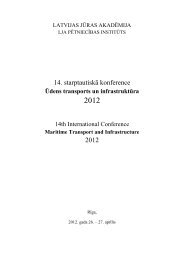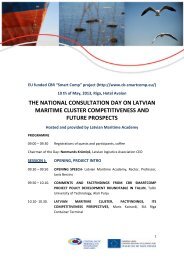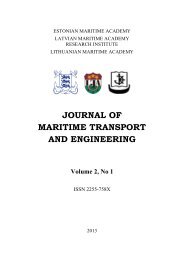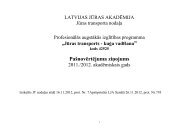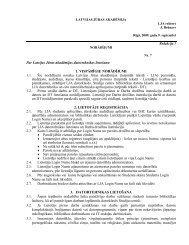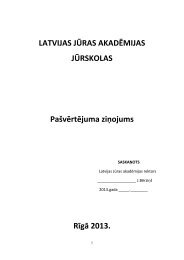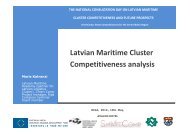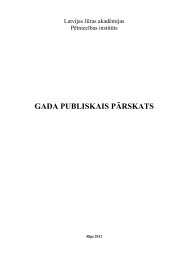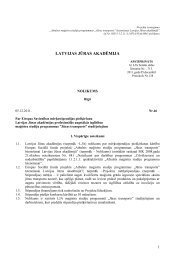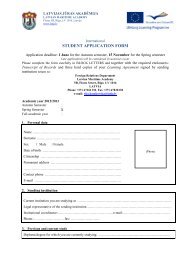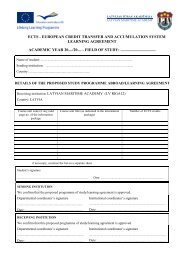Latvian Maritime academy
Latvian Maritime academy
Latvian Maritime academy
You also want an ePaper? Increase the reach of your titles
YUMPU automatically turns print PDFs into web optimized ePapers that Google loves.
strong competition among international ship owners. VLCCs and ULCCs cover the most solitary trade<br />
routes, typically loading at offshore platforms or single-point moorings and discharging at designated<br />
lightering zones off the coast. As the demand for more crude oil is increasing and as more oil reserves are<br />
being discovered and developed in other areas such as the Caspian Basin, Latin America and the Middle<br />
East, the need for more tankers has grown.<br />
The recommended change regarding training issues<br />
STCW Manila Amendments<br />
On June 25th, the International <strong>Maritime</strong> Organization (IMO) and other major stakeholders in the<br />
global shipping and manning industry formally ratified the so-called "Manila Amendments" to the current<br />
Convention on Standards of Training, Certification and Watchkeeping for Seafarers (STCW) and its<br />
associated Code. The amendments aiming to bring the STCW up to date with developments since its<br />
conception and initial adoption in 1978, and the subsequent amendments in 1995. The Convention<br />
amendments will be adopted with a tacit acceptance procedure which has been agreed indicating that<br />
amendments will be accepted by 1st July 2011 UNLESS more than 50% of the parties to the STCW<br />
object such a development. As a result STCW Amendments are set to enter into force on January 1, 2012.<br />
Enhancement of STCW Objectives<br />
The following items outline the key improvements realised through the new Amendments:<br />
# certificates of competency & endorsements to be issued only by Administration - thereby reducing<br />
the possibility of fraudulent practices associated with issue of certificates of competency;<br />
# common medical standards for seafarers - seafarers from one country can serve on board ships of<br />
another country without undergoing another medical exam;<br />
# revalidation requirements rationalized for the benefit of the seafarer;<br />
# introduction of modern training methodology, i.e. distance learning and web based learning;<br />
# hours of rest harmonized with the requirements of ILO <strong>Maritime</strong> Labour Convention (2006) with a<br />
view to reducing fatigue;<br />
# requirements introduced to avoid alcohol and substance abuse;<br />
# new competencies required to be built and curriculum to be updated in life with modern<br />
developments and real life needs;<br />
# refresher training is properly addressed within the convention.<br />
A brief outline of key curriculum upgrades is as follows.<br />
Chapter I: General provision.<br />
Regulation I/2: only Administrations to issue COC & maintain electronic database for verification of<br />
authenticity.<br />
Regulation I/3: near coastal voyage requirements made more clear, including principals governing<br />
such voyages and entering "into an undertaking" with the Parties concerned (flag and coastal states).<br />
Regulation I/4: PSC Assessment of seafarer watch keeping & security standards - "Compromise to<br />
security" in the list.<br />
Regulation I/6: Guidance on e-learning.<br />
Regulation I/9: Medical standards updated in line with ILO MLC Requirements.<br />
Regulation I/11: revalidation requirements made more rational and includes revalidation<br />
requirements for tanker endorsements.<br />
Regulation I/14: companies responsible for refresher training of seafarers on their ships.<br />
Current programs<br />
In order to provide the graduates of a maritime institute with a thorough and suitable education that<br />
includes the professional, competent knowledge and skills necessary to be a competent mariner, the MET<br />
institutes need to periodically revise the content of their curriculum as per new technologies installed<br />
onboard and industry needs. According to D. F. Sears [21], “Unfortunately, we are not masters of our<br />
own curriculum”, nevertheless, MET institutes should respond to the needs of the shipping companies, as<br />
the latter are the ones which employ their graduates, if the graduates require proficiency in a certain field.<br />
A good example would be the training on the use of Electronic Charts, as many shipping companies<br />
would necessitate that their Deck Officers have had the essential training ashore before joining on board<br />
as they have outfitted all of their vessels with ECDIS equipment.<br />
30



